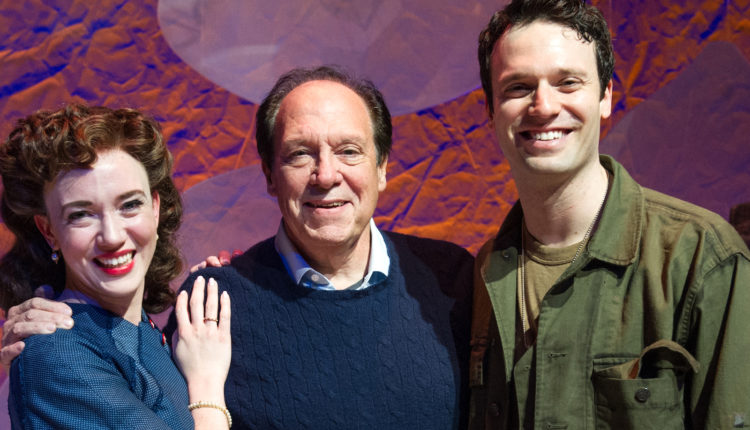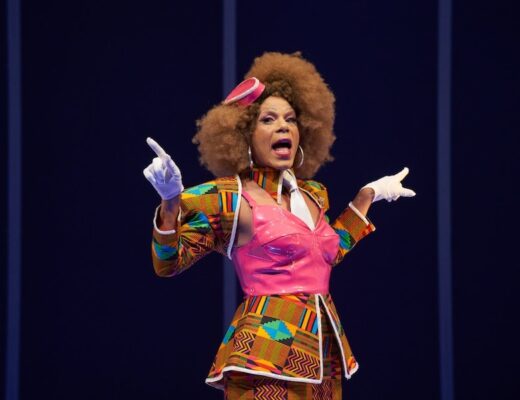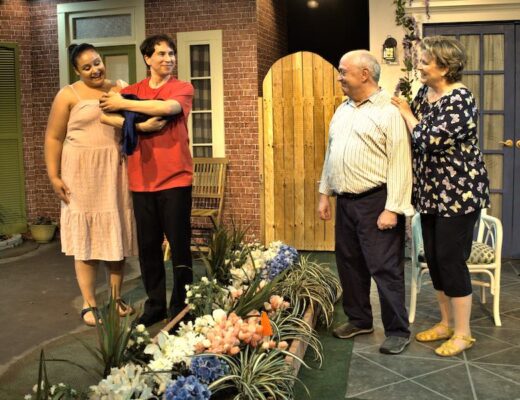By Julian Oquendo
This article was first published in The DC Line here.
Once you know who wrote the play, there’s little doubt about whether Dear Jack, Dear Louise has a happy ending. The playwright — Ken Ludwig, one of DC’s most prolific and most produced comedic theater writers — is the younger son of the main characters, and the Arena Stage premiere wrapping up this weekend focuses on how his parents met.
The writer has over two dozen performed productions in his repertoire, with a quarter of them having premiered in DC-area theaters. Ludwig is widely recognized for the classics Lend Me a Tenor, Moon Over Buffalo and others. With Dear Jack, Dear Louise, Ludwig — who’s best known for his parodies and farces — has taken a slightly different approach in writing the story of how his mother and father first met and fell in love in the early 1940s.
Before they ever saw each other face-to-face, Army doctor Jack Ludwig and Broadway chorus actor Louise Rabinoe wrote letters to each other — at the suggestion of their parents — while Ludwig was stationed in Oregon and Rabinoe auditioned for roles in New York City.
“When you’re a playwright, you think about, ‘What means most to me?’” Ludwig said in a recent interview. “I adored my parents. I knew they have lived through this very interesting past of meeting by letter and spending the first part of their relationship only knowing each other by letter. Because it was World War II and they were 3,000 miles apart, it’s always been on the back of my mind of writing a play [about my parents].”
What results is not just a story about Ludwig’s parents, but a snapshot of how members of the “Greatest Generation” found connections in a fractured world.
When asked about casting choices, Ludwig says he wasn’t going for physical resemblance.
“I didn’t base the choice on look-alikes at all,” he said. “A couple of people who knew my parents said that [the actors] both kind of look like my parents, with the wire-rim glasses for my dad and my mom as a brunette. I was looking for people who could capture the spirit of these characters.”
He explains that he wasn’t aiming just to tell the story of his own family — though their distinctive personalities help enliven the play while offering a look at the World War II era.
“I was trying to represent the spirit of the age,” Ludwig said. “Dad was a serious, shy, soft-spoken doctor who took doctoring very seriously, and mom was a much more flamboyant young woman who wanted to be in the theater.”
Expertly portrayed by actors Jake Epstein and Amelia Pedlow, the two have an inherent charm and chemistry on stage. They don’t read directly from the letters they’re sending out, but instead have a conversation with each other while facing out to the audience.
Ludwig cited a reviewer who likened the postal courtship to online matchmaking today — a gratifying element in the play, he says, though it was entirely unintentional.
“[As the writer pointed out,] seen on stage, writing letters looking outwards is not dissimilar to people currently getting to know each other on social media. I didn’t think about that for one instant while I was writing the play,” Lugwig said. “The fact that it feels like that is great. It just shows that meeting and getting to know someone is a universal feeling that probably hasn’t changed in 2,000 years.”
When writing the play, Ludwig knew that in order to tell the story in this format, he would have to build it from the memories of the letters, rather than from the letters themselves.
“Before my mother passed away, she destroyed the letters,” Ludwig said, explaining that his mother saw the letters as an intimate portrayal of their relationship. “I had to make the letters up from scratch. I knew the outlines of what happened. I knew that my mother met my father’s very large family all at one time. … I knew all the important points.”
In retrospect, Ludwig says not having access to the actual letters proved both pivotal and fortuitous.
“I was thinking recently, maybe having the letters would have been stifling and not produced the same kind of play,” he said. “Accuracy was not my goal: This is a play. I needed to dramatize it, make it enjoyable to watch — tragic and comic, and all the things we do with plays. I think it ended up being a very good reflection [of] them as how they must have been at that age.”
As a DC resident since the mid-’90s, Ludwig has seen the city and its theater scene evolve. He moved to the city to be close to his family; he and his brother have generally lived within three or four blocks of one another throughout their adult lives.
“I wouldn’t want to live anywhere else,” he said, highlighting his affinity for the National Mall and its museums and galleries. “It’s a great place to raise my family — a wonderful place to live.”
Ludwig ties those feelings to an “innate optimism” that also explains his affinity for comedy. He just wishes it were more widely shared.
“That’s why I write plays — to give us a sense of hope,” he said. “When people do Shakespeare classes, they teach Hamlet, King Lear, the Scottish play, all the tragedies. They don’t teach the comedies. There’s no reason for that. It’s crazy. The comedies tell us as much or more about life than the tragedies do. … I think what gives us hope for the future and makes us better people and makes us think about each other in a kindly way is comedies that give us a sense of hope. That’s what I try to write.”
Edgar Dobie, executive producer for Arena Stage and a longtime friend of Ludwig’s, finds that hope present throughout his body of work. Arena has produced a number of Ludwig’s plays, including Shakespeare in Hollywood and Baskerville: A Sherlock Holmes Mystery. “His biting wit and ability to find grace within farce have brought him international acclaim,” Doble notes in the program for Ludwig’s latest play.
As far as Ludwig is concerned, DC merits recognition as one of the great theater cities of the world.
“It’s a vibrant, vital, wonderful theater community — dozens of professional theater companies doing tremendously great work, and I love the theatre community. I wish we did more comedies — but maybe I don’t, maybe that’s the reason I can do my comedy,” said Ludwig, pivoting to an examination of the art form. “When I say comedies, I don’t mean frivolous comedies; I mean works that give us a sense of hope.”
In the production’s program, Arena Stage artistic director Molly Smith describes Dear Jack, Dear Louise as a standout from much of Ludwig’s work, a romance that swept Smith in each time she read the script: “Dear Jack, Dear Louise is a departure from Ken’s usual writing, and I think it’s his finest play yet. True, there are fewer hijinks, less door slamming, and only two actors; yet the play manages to capture all that we love about Ken’s voice — his ability to close the void between people with compassion and laughter.”
Having written prolifically for years, Ludwig is no stranger to changes and evolution in his craft. After focusing early on farces, he shifted toward more complex comedies and adaptations, drawing multiple awards, including two Olivier Awards, two Tony Awards and — locally — two Helen Hayes Awards.
For DC’s Everyman Theatre, he created a new adaptation of Thorton Wilder’s version of the classic restoration comedy The Beaux’ Stratagem. For the Adventure Theatre in Glen Echo, Maryland, he has adapted multiple works, including Tiny Tim’s Christmas Carol and ’Twas the Night Before Christmas.
His most produced work, Lend Me a Tenor, is widely renowned and performed across the nation, with two Broadway runs and more than 25 productions set for 2020. Described by publisher Samuel French as “a madcap, screwball comedy,” the play is not without the potential for controversy — set in 1934, the zippy show as recently as 2015 included a moment when a character, preparing to play Othello, donned blackface.
Amid the political controversies surrounding politicians such as Virginia Gov. Ralph Northam and Canadian Prime Minister Justin Trudeau, Ludwig said he has reconsidered the original staging and removed this element from upcoming productions.
“The issue was never ever raised in the history of doing this play, but I just felt that, in terms of where our world is, and what is the right thing to do, I just changed the play,” he said.
At least one company that had planned to mount Lend Me a Tenor raised objections to the revisions and canceled instead.
As far as the reaction to his most recent premiere, Ludwig looks forward with optimism — though he’s made no decision as to whether any future plays will resemble the scale of Dear Jack, Dear Louise.
“I’ve been thrilled that people are going and that people are loving [Dear Jack, Dear Louise],” Ludwig said. “I’m just happy people like it. Now, for the first time I’ve written a play that had just two people on stage and digging deeper into their lives. I don’t know if this will continue as a trend or not.”
Might we see more productions that touch on an emotional and historical core?
“I don’t know,” he said. “Maybe, when I sit and think what my next play is gonna be. If the next idea is a comedy, I’ll do that. It truly goes play to play.”





No Comments